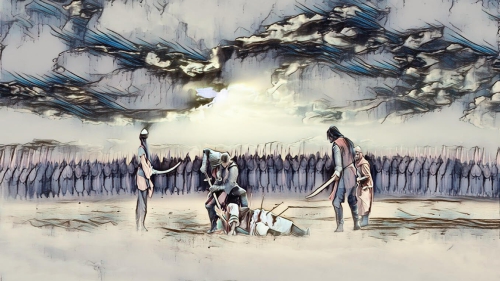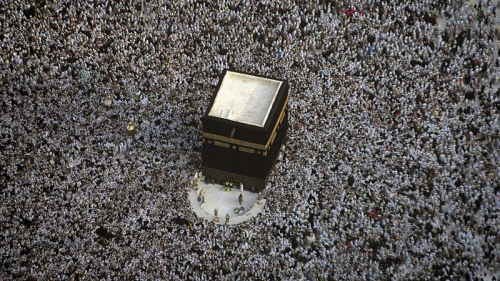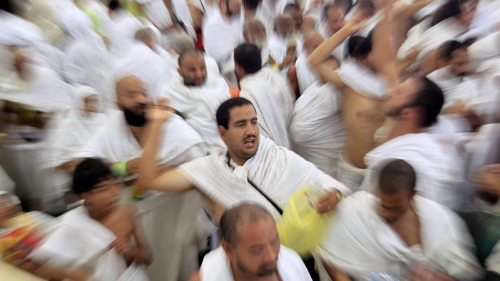Prophet Shu'ayb and Lessons in Business Ethics

Prophet Shu'ayb was sent to the people of Madyan. Madyan was the name of a tribe and also of a city. The city was located in the northwest Arabian Peninsula between the territory of Hijaz in the south and that of Sham in the north. The people of Madyan were also known as the "dwellers of al-Aykah (the Woods)" (al-Shu'ara', 176).
They were descendants of Madyan, a son of Prophet Ibrahim from his third wife, Qaturah. Though all of them had not directly descended from him, they proudly claimed to be so. Thus, at no point in time were they, complete strangers, to the notions of Islam, prophet-hood, and monotheism (tawhid).
The people of Madyan were renowned as great traders. They lived in prosperity. Their city was well developed and prosperous, exuding an aura of worldly success and elation. Their city lay at the crossroads of several major trade routes that connected some of the world's significant trading midpoints, such as Yemen, Makkah, Syria, Iraq, and Egypt.
However, they soon got carried away by their auspicious economic condition. They turned away from following the truth and worshiping the one true God in favor of falsehood and polytheism (shirk). They developed an array of evil practices associated with business, such as greed, egotism, cheating, stealing, violence, and generally spreading mischief on earth.
When Shu'ayb, their brother and fellow countryman, was sent to them as a prophet, he was tasked to return them to the ways of the truth and to remedy their repugnant business thought and actions. However, they obstinately rejected him and his call, providing all sorts of shallow and selfish justifications. They were not ready, nor willing, to give up their way of life and to submit themselves to the will of their Creator.
Eventually – consistent with the laws of existence and history – they were afflicted with punishment. The earthquake overtook them, and they became motionless bodies in their homes (al-A'raf, 91). "Those who denied Shu'ayb - it was as though they had never resided there. Those who denied Shu'ayb - it was they who were the losers" (al-A'raf, 92).
The punishment was corresponding with the nature and extent of Madyan's mischief. Their material prosperity was used as a means of their destruction. As they became a byword for economic injustice and wickedness, what had befallen them likewise became an exemplar of retribution and justice.
The account of Prophet Shu'ayb's mission is featured extensively in three chapters (surahs) of the Qur'an: al-A'raf (85-93), Hud (84-95), and al-Shu'ara' (176-191).
The following are five major lessons in business ethics that can be extracted from Shu'ayb's experiences with his people.
Worshiping God as the source of all good
The first and most important thing Shu'ayb asked his people was to worship, fear, and obey God. He also asked them to obey and follow him in his capacity as a messenger of God. Shu'ayb did so because that was the source of all good. The opposite was the source of all evil.
For that tenet, there came to them clear proofs and evidence from God. In fact, the personality of Shu'ayb and his extraordinary conduct was the most compelling pieces of evidence. Shu'ayb was a trustworthy messenger who spent his entire life giving his people good and sincere counsel. Amid their prevalent materialism and pleasure-seeking, he asked for no payment or reward for his mission. His reward was only from "the Lord of the worlds."
Successfully conveying the message was the meaning of Shu'ayb's success, and the people's happiness, the meaning of his happiness. Even in the end when his people's non-belief and dishonesty proved unyielding and when he had to turn away from them, he once more felt the need to underline his paradigm: "O my people! I did indeed convey to you the messages for which my Lord sent me, and I gave you good counsel, but how shall I lament over a people who refuse to believe!" (al-A'raf, 93).
Shu'ayb wanted to correct the worldview of his people and to inculcate in their hearts positive values. He wanted to create a foundation from which equally positive deeds could originate. That foundation was meant to be a cause, leading to an open-ended field of opportunities as effects.
In other words, Shu'ayb aimed to build a lasting and robust character in his people, creating an inner state that would determine their actions, manners, and attitudes. He aimed to make them excellent and enlightened, for only such people could constitute good societies and lead ethical and honorable lives.
His people were universally evil because they were not believers. If they changed their spiritual condition and status, everything else would have changed entirely. Belief in God was the precondition for any spiritual and moral progress.
Positively, a person who rejects his Creator, his inborn disposition, and the natural order of things cannot be genuinely good. He and goodness are incompatible. Goodness is associable only with that which such a person rejects. His professed goodness is a relative and transient thing, in line with the relativity and transience of the motives that gave rise to it.
Shu'ayb then directed his people to the threshold of a path leading to the true meaning of prosperity and contentment in this world, and the Hereafter. He told them to seek forgiveness from their Lord and to repent to Him. He also told them to look forward to and have hope in the life to come. It was never too late to do so.
As a form of motivation, he likewise told them that their Lord is Most Merciful and Most Loving. He was there for them, loving them and caring for them more than they did for themselves. God and His revealed truth were their best guardians in their ongoing existential pursuits.
That was the meaning of Shu'ayb's reform. However, he knew the complexity of the task, so he promised that he would persevere in it to the best of his ability. He also promised that he would lead by example, wishing not "to differ from you in that which I have forbidden you" (Hud, 88). His success could come only through God, hence "upon him, I have relied on, and to Him I return" (Hud, 88).
The message of Shu'ayb was this. Before building a community, people are needed to be built first. Before excellent outputs, excellent inputs are required. The quality of the form and social systems depends on the quality of the innermost substance and spirit.
A community is good and productive only because of good, creative and dynamic ideas and virtues that permeate the complete being of its members. Accordingly, there are no good, just, prolific, and ethical societies; there are only good, just, prolific, and ethical people. Just as there are no corrupt, evil, immoral, and failing societies, there are only corrupt, evil, immoral, and failing people. Good and bad societies are metaphorical expressions. Good and bad people are the real thing.
Society is an abstract idea; its people, with their thinking and behaving designs, accord it tangible and measurable qualities. Owing to this, the Qur'an reminds us that "indeed, Allah will not change the condition of a people (nation) until they change what is in themselves" (al-Ra'd, 11).
Ethics cannot operate without sound principles and values. Without them, ethics is no more than a dead-letter and a plaything in the hands of the established order. It remains subservient to the power of authorities and their vested interests and artificial laws.
In the same vein, without an ethical framework to enforce themselves, sound principles and values remain confined to the level of theory and abstract articulation. Like desolate ethics, they too are destined to play perennially second fiddle to dubious socio-politico-economic standards and laws.
Ethics and law ought to be twins, forming together with a happy family unit with the worldview and belief system. They should originate from each other and derive their strength and legitimacy from each other's ideological and operational compass.
Denying God as the source of all evil
Despite everything, the inhabitants of Madyan rejected Shu'ayb and his heavenly teachings. Like many nations before them, they succumbed to the advances of their desires, worldly ambitions, and fantasies. They traded truth for falsehood, light for darkness, and certainty for skepticism.
However, to satisfy the hankerings of their souls, which had been rendered innately inclined to worship the Creator and Master of the universe, they had no choice but to resort to inventing their creed and code of (mis)conduct. Such were mixtures of what their forefathers used to worship and of standards and values they concocted while trying to fulfill their private and national interests as well as programs.
Shu'ayb emphasized that they had no other deity except Almighty God, and associating anything with Him was the most heinous transgression. They contested that Shu'ayb had no right to question their principles and behavior and command them to forsake what their predecessors had worshiped.
The people persisted in their blasphemous ways. Consequently, their senses became incapacitated, and their minds, as well as souls, blinded. Their hearts were so hardened that they could not see beyond the mandates of the raging egos and the vain desires. In short, they became an incarnation of evil. They and evil became one.
As such, no good of any kind was coming from such people. Everything they thought of, uttered, and did was infused with elements of immorality and sin. They were pawns in the hands of Satan. They were incubators of meanness and harm.
Therefore, it is no surprise that their conduct often defied logic, naturalness, and common sense, resulting from the irrationality, absurdity, and unnaturalness of their falsehood and polytheism. Just as there was nothing good, there was likewise nothing utterly natural and normal with them. The simple and straightforward they rendered difficult and ambiguous, and the good and valuable they turned into bad and injurious. The only thing that mattered was them and their short-term gains.
For example, notwithstanding the clear signs and evidence entailed in Shu'ayb's mission, and even though Shu'ayb was so eloquent and persuasive in speech, that he was called "the orator of the prophets", his people told him that they did not – and could not - understand much of what he was saying to them (Hud, 91). They behaved as though their prophet was in one, and they in another valley. They were not on the same page, extinguishing thus all hopes for reform.
Moreover, the people considered Shu'ayb as weak and disrespected among them, and his case was inconsequential. Were it not for the power and honor of his family, they would have stoned him to death. The other option was to force Shu'ayb and those who had believed with him to return to the state polytheistic religion. If not, all of them were to be evicted from the city (al-A'raf, 88; Hud, 91).
Displaying his prophetic wisdom, self-control, and sympathy for the psychological and spiritual conditions of his people, Shu'ayb avidly responded: "O my people, is my family more respected for power by you than Allah? But you put Him behind your backs (in neglect). Indeed, my Lord is encompassing of what you do" (Hud, 92).
He also told them: "And O my people, let not my dissent (from you) cause you to sin, lest you suffer a fate similar to that of the people of Nuh or Hud or Salih, nor are the people of Lut far off from you! (Hud, 89).
The people of Madyan were warned that they were treading the road that was leading to destruction. Their behavior was akin to hitting the self-destruct button. It was a gradual suicide.
As part of their rejection of Shu'ayb and their malicious campaigns against him and his cause, the people kept accusing him of being bewitched and insane, of being a mere mortal like them and so, unqualified for the task, and of being a liar. They requested, as a symptom of their disorders: "Therefore cause a portion of the heaven to come down upon us if you are one of the truthful" (al-Shu'ara', 185-187).
Obviously, instead of learning something from the unfortunate fates of previous nations, the people of Madyan fell headlong into the same traps. They dug a pit for Shu'ayb and his few followers but fell themselves into it. Their doomed legacy became a sign of how life is not to be lived and how things generally are not to be done.
Business and justice
After polytheism, the biggest and most widespread wrongdoings of the people of Madyan were related to business as their means of subsistence. They were reputed as evil and skillful cheats. Their imagination in this regard knew no bounds.
Hence, their prophet Shu'ayb addresses them as follows: "Do not decrease from the measure and the scale…Give full measure and weight in justice and do not deprive the people of their due" (Hud, 84-85).
The word for the scale in Arabic is mizan, which at once is a symbol and synonym of justice. It also signifies harmony and equilibrium. Since business is a form of endless interactions (transactions and contracts) between people, whereby they are expected to constantly give and take, "giving full measure and full weight, and not defrauding people" became a sign of a good, and the opposite a sign of a bad, business practice. The canon grew to be a foundation and identity of business ethics.
Echoing the same spirit, the Qur'an sums up the essence of unethical business dealings: "Woe to those who are fraudulent (in weighing and measuring); who, when they take a measure from people, take in full, but if they give by measure or by weight to them, they cause loss. Do they not think that they will be resurrected for a tremendous Day, the Day when mankind will stand before the Lord of the worlds?" (al-Mutaffifin, 1-6).
In order to lay further emphasis on the matter, the name of the Qur'anic chapter (surah) in which these verses are given is called al-Mutaffifin, which means "Those who deal in fraud and cause loss." By merely mentioning in any situation the name of the surah, the message is highlighted, and a warning is delivered.
Owing to the socio-political importance of business, the symbol of the scale and its justice, harmony, and equilibrium connotations quickly took on a socio-political significance as well. In that manner, justice and harmony in business essentially became propellers of justice and harmony in the rest of the social and political spheres.
In reciprocal relationships, justice in business means social justice, and business development means, correspondingly, social and human development. Conversely, injustice in business means social injustice, and business degeneration and regression mean, correspondingly, social and human degeneration and regression. Without a doubt, business and economic potency denote the face of society, yet of civilization.
It must be stressed that the Qur'anic interpretation of mizan (the scale) as balance, measure, and justice is much more profound. It is all-inclusive and concerns the whole of physical and metaphysical existence. The idea of mizan mentioned earlier represents but a portion of that comprehensive philosophy and a way of life. That indeed calls attention to how important the concept of justice in general ontological terms is, on the one hand. On the other, how important business ethics in Islam is, with justice and objectivity at its core.
In the Qur'anic chapter (surah) al-Rahman, three types and levels of mizan are presented consecutively. About the first and highest level, God says: "And the heaven He raised and imposed the balance (mizan)" (al-Rahman, 7).
This means that having created the universe, God caused it to subsist according to the ultimate balance, measure, equilibrium, and justice principles. Mizan is the universe's soul. The universe operates according to the exact mathematical laws and balance. In 2014, a scientist wrote a book called "Our Mathematical Universe," positing that reality is a mathematical structure.
It is then said about the second type and level of mizan: "That you not transgress within the balance (mizan)" (al-Rahman, 8).
This means – and God knows best - that man as God's vicegerent on earth has been entrusted to recognize, respect, benefit from and sustain the established mizan in creation. All the cultural and civilizational undertakings of man should aim towards the realization of those noble objectives, standing for the truest meaning of sustainability and sustainable development.
Man, therefore, is expected neither to transgress within the created mizan nor to seek to defy it by attempting to create and impose his own alternative mizan paradigm. Man is invited to explore mizan and to elevate his rank thereby.
And about the third level and type of mizan, the Qur'an says: "And establish weight in justice and do not make deficient the balance (mizan)" (al-Rahman, 9).
This is the level of business dealings in particular and all human interactions in general. The message conveyed thereby is that the third and lowest level of mizan is as much an extension as a reflection of the two higher levels. The mizan of business relations and dealings is a microcosm of the heavenly mizan order. Its worth is appreciated not only on earth and among its inhabitants but also through Heaven's highest tiers.
Indeed, this hierarchy of mizan (balance and justice) some Jews in Madinah had in mind when they commented on an act of justice that left them amazed: "On the strength of this (justice), the universe was created and subsists." They could know this solely because of their status as the People of the Book (Scripture).
The same holds true concerning unjust business dealings. They, too, are rejected and loathed as much on earth as in Heaven. They will never be compatible with the established existential model. In the end, something must give way. Moreover, since business wrongdoings are wicked inventions, unnatural and aberrant courses of action, they and their protagonists will sooner or later be dealt with by God as the Creator and Sustainer of life. Their unnatural ways of doing things normally generate proportionately unnatural and painful consequences.
It was due to all this that Shu'ayb never stopped warning his people: "Indeed, my Lord is encompassing of what you do. And O my people, work according to your position; indeed, I am working. You are going to know to whom will come a punishment that will disgrace him and who is a liar. So watch; indeed, I am with you a watcher, (awaiting the outcome)" (Hud, 92-93).
The Qur'an concludes concerning the final destiny of the people of Madyan by saying: "Those who denied Shu'ayb - it was they who were the losers (were completely ruined)" (al-A'raf, 92).
The day in which Madyan was destroyed, the Qur'an calls a tremendous and awful day. It says in all that, there is a sign for whoever wants to learn about the consequences of non-belief and corruption as a lifestyle. It means that the roads to both success and failure are clearly mapped. People are free to make their choices, after which they and nobody else will be held accountable for them - just as what happened to the inhabitants of Madyan.
Both the day when Madyan was flattened and the day when according to the al-Mutaffifin surah "those who deal in fraud and cause loss to people" will be resurrected and brought to account, are called yawm 'azim, which means "a tremendous and awful day." Whenever business misdeeds are brought to an end by an intervention of God and his operative laws, that is to say, whenever their perpetrators are called to heavenly account, in this world or the Hereafter, such a day, indeed, is a tremendous and dreadful day for those affected.
Business and mischief
In many ways, business misconduct is the mother of all evil. It originates from and feeds on the biggest weaknesses of man: the desire for longevity and power, avarice, and pleasure-seeking. No person conducts business and seeks wealth purely for business's or wealth's sake. People wish to thus cultivate and satiate their inherent materialistic and animal impulses.
However, such is the nature of greed and hedonism that they are insatiable. The more they are fed, the more demanding they become. They generate a vicious circle from which a person can hardly free himself. The situation is reminiscent of a thirsty person who drinks salty water. The more he drinks it, the thirstier he becomes, until eventually he is made terminally ill or is even killed by it.
Prophet Muhammad (peace and blessings be upon him) once said that a man becomes old with senility, but two things remain with him intact: greed and (false) hope (al-Bukhari).
He also said that if a man possessed two valleys of gold, he would long for a third one; "and nothing would fill (satisfy) the stomach – or the mouth – of the son of Adam but dust (that is after he dies)" (Muslim).
Accordingly, when a person's negative qualities become loose and unrestricted, they easily take control of his entire being, affecting his actions and decision-making. Such a person, in turn, becomes loose and uncontrollable morality- and thought-wise. No undesirable action that comes from him should be seen as a surprise.
A greedy and materialistic person spends his entire life chasing the unchaseable and trying to attain the unattainable. Like a bottomless pit, no matter how much he earns and owns, he will always feel empty and in need of more. He is fated to live and die as poor and "needy." If he only knew that being rich is not about how much one has, but about how much one needs and what and how he feels. To be rich and poor is a state of mind.
Business is as much a private as a social undertaking. A faction of stakeholders is involved. The bigger a business, the more impact it generates. A nation's economy is made up of businesses, so to speak, translating itself into a massive blend of production, selling, and consumption activities. Hence, unethical businesses affect not only the individuals directly involved, but also, indirectly, myriads of other sectors of society. People's interests and involvements overlap, inevitably causing disagreements, tensions, and conflicts at all levels.
Examples of the consequences are unhealthy competition, rampant corruption, marketing wars, environmental destruction, cronyism, nepotism, abuse of power, discrimination, dishonesty, and injustice. The principle that the end justifies the means becomes everybody's doctrine. All forms of mischief then find their ways into the vast realm of business. Their fertile grounds beckon from there. Under the circumstances, might becomes right, and double-dealing a recipe for success. As they cannot be commercialized, righteousness and integrity carry no weight and are unwanted. They become anomalous.
Individuals, groups, and even entire societies become ready to stop at nothing to achieve their corporate goals. In the wild materialism environments, making a profit at any cost turns out to be the holy grail. Because of extensive and stiff competitions, force and aggression are not excluded from the mix either. On the contrary, their prominence and effectiveness keep rising.
In passing, the majority of the most regrettable episodes in human history occurred, partly or completely, due to certain economic considerations. Some of such episodes were colonization, slavery, World War I, World War II, and the current War on Terror. According to some respectable estimates, most of the future wars will be waged over fast-depleting natural resources. They will be macroeconomic wars, leading to endless micro-business battles and rivalries.
Needless to say that the people of Madyan were cast in the same ideological and behavioral mold. Their evil extended from sheer unethical business procedures to highway robberies and spreading general mischief on earth. They also tried to hinder from the path of God those who had believed in Him, seeking to make that path deviant and crooked. Shu'ayb himself would have been either banished or stoned to death were it not for his family's reputation and influence.
Madyan's chief problem with Shu'ayb was that their selfish economic interests were threatened by his preaching of altruism, egalitarianism, and benevolence rooted in Islamic monotheism. Even their religious objections were projected through the lens of their economic anxieties. To them, Shu'ayb and those who followed him were public enemies and so, had to be dealt with most harshly.
Shu'ayb did not mince his words with the people. He told them that their actions were ruining, apart from themselves, their entire surroundings, and beyond. Irrespective of what they thought, their demeanor amounted to a system of total malice and destruction. It was anything but prosperity and reform. They were antitheses of progress, peace, and success, ever ready to put a price tag on everything.
Finally, the Qur'an says: "O you who have believed, do not consume one another's wealth unjustly but only (in lawful) business by mutual consent. And do not kill (destroy) yourselves. Indeed, Allah is to you ever Merciful" (al-Nisa', 29).
Connecting unjust and unlawful business with destruction and killing in this verse is twofold. Firstly, conducting business unjustly and unlawfully guarantees committing various prohibitions, falling into sin, and eating up people's property unjustly, all of which are forms of spiritual and moral destruction. Secondly, doing so indeed leads to actual violence and killing.
The origins of liberal capitalism
Liberal capitalism is an economic philosophy that promotes unregulated, liberal, and free-market economic activities. It stems from the liberal and materialistic worldviews which comprise peculiar views of man, life, society, and freedom. In it, it is individuals, households, and small groups (elites) and their exclusive economic decision-making that are placed on a pedestal. Collective institutions and organizations and their supervisory functions are relegated to the level of second-best, performing as observers.
The main principles of liberal capitalism are materialism, individualism, and consumerism. It derides cooperation, collectivism, spirituality, and morality. It is a system "based on the private ownership of the means of production and their operation for profit."
In 1987, Pope John Paul II denounced liberal capitalism in the strongest terms. He equated it with the evil of Marxist communism. He did so because of their "all-consuming desire for profit and the thirst for power at any price."
In any case, it stands to reason that the business behavioral patterns of the people of Madyan functioned as though the seeds of the foundation of liberal capitalism. They passionately objected to the prospect of Shu'ayb and his religion interfering with their business culture. Astounded, they asked Shu'ayb why his prayer (solat) – as a personification and face of Islam – was commanding him, among other things, that they should not do with their wealth whatever they pleased (Hud, 87).
They were not happy that their business freedom was targeted and was aimed to be curtailed and regulated, more so if such was done by a religious authority they did not subscribe to. They believed that loss and ruin resided in faith and virtue. They tried to dissuade the believers from believing and following Shu'ayb: "If you should follow Shu'ayb, indeed, you would then be losers (ruined)" (al-A'raf, 90). However, then, little did they know that loss and ruin in both worlds were precisely with what they were doing: "Those who denied Shu'ayb - it was they who were the losers" (al-A'raf, 92).
However, the mentioned inquiry of Madyan quickly morphed into a form of ridicule, both of Shu'ayb and of his religious initiative. In jest they told him that he was the clement one and a person of forbearance (al-halim), as a result of which he was supposed to help them and regulate their business culture. They furthermore called him al-rashid, which means "the discerning and right-minded," jokingly implying that as such, he was the most qualified person to do what he was up to. He was yet more knowledgeable of their condition than they were (Hud, 87). It was his duty to "guide" them.
Shu'ayb, on the other hand, was only inviting his people to the truth and honesty. He, at the same time, wanted them to be pragmatic and fair. He was and proved himself as their best friend and most sincere ally.
He was reminding them that they were a prosperous community. In the past, they were few, and their condition was different, but God, by His grace, increased them. Therefore, they should have been more humble and grateful. They needed to work on sustaining their privileged state, rather than working on undermining and eventually terminating it.
They needed to be wiser and see how the end of the corrupters before them was. Was it that they were heading towards the same terrible end? Shu'ayb pleaded with them that the profit which God has left for them, after giving the rights of people, was sufficient and better for them than what they could gain through deceitful ways (Hud, 86).
Spiritual worth, contentment, and blessings in wealth are more meaningful than sheer quantity, insatiability, and a curse. They are more enriching. Almighty God is the Creator and Owner of all wealth. Humanity is given but a tiny portion thereof as a trust as well as a test. People are allocated different shares as determined by the absolute wisdom and justice of God and His providential plan.
Thus, it befits only God and His revelation to function as a regulatory blueprint and a frame of reference insofar as the evolving business systems and procedures of mankind are concerned. Doing otherwise spells a rebellion against God, intrinsic human nature, and the order of the natural world.
It is a war man cannot win.
Topics: Adab (Islamic Ethics), Business, Criticism Of Capitalism, Greed, History, Injustice, Materialism, Prophet Shuayb, Prophethood, Satan (Iblis), Social Justice, Worship (Ibadah) Values: Harmony, Justice
Views: 12623
Related Suggestions

















